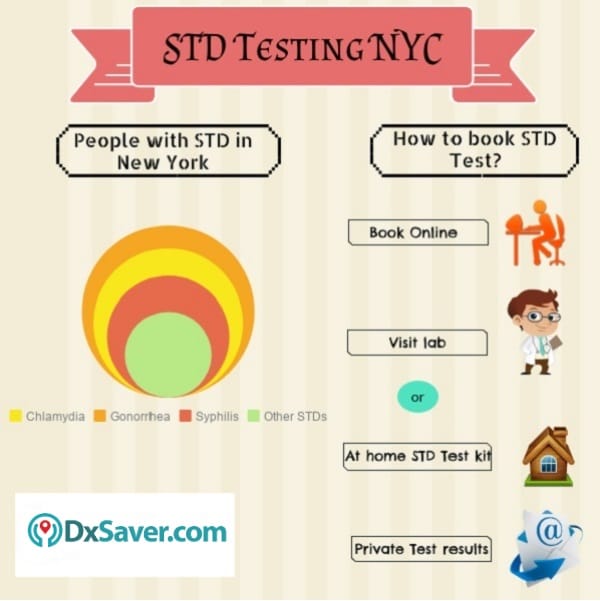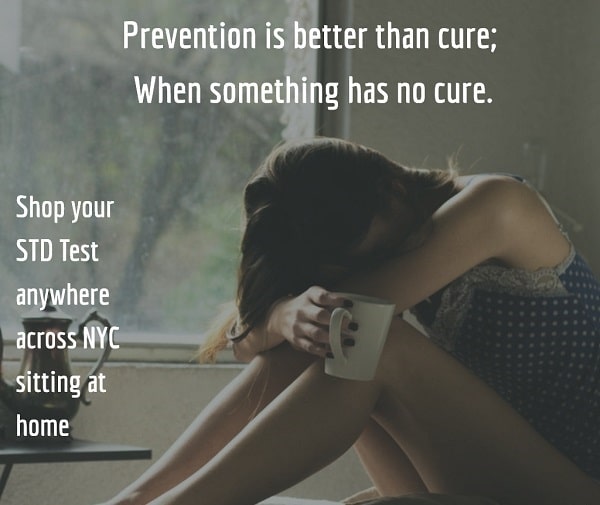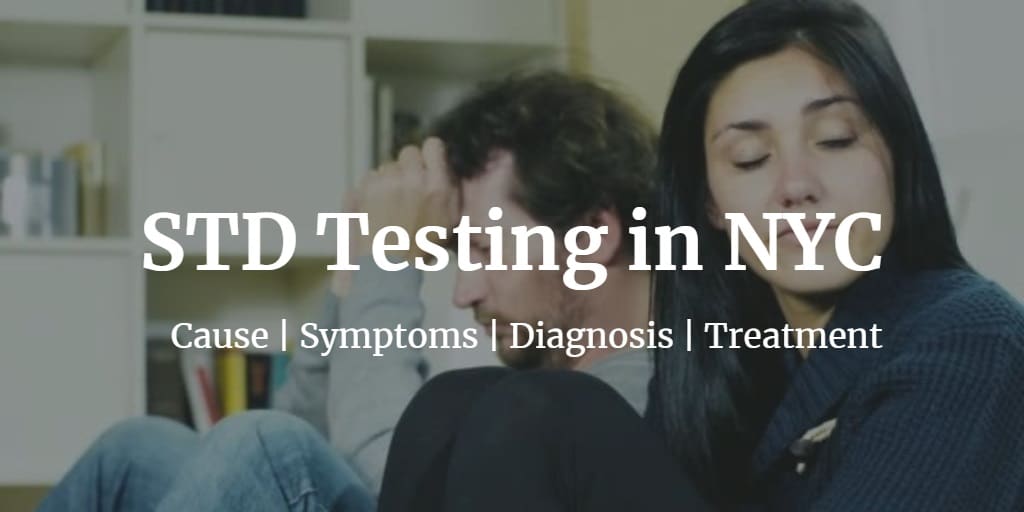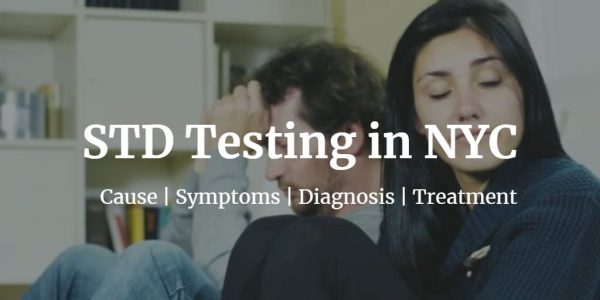If you are looking for STD testing in New York including New York City (NYC), you have come to the right place. In this post, we will cover various aspects of STD testing in NYC including making a recommendation on the providers and you can book STD testing at labs near you online.
Options for STD Testing in NYC and New York State
We have shortlisted two providers for STD testing in New York. They are STDCheck and Health Labs. The providers have been selected due to the density of testing labs (so that you do not have to travel too far) and the high quality certified labs in their network.
Both of the providers offer the following advantages:
- 100+ labs across New York with over 50 in NYC
- Easy online booking process
- Results in 1-3 days after testing
- FDA approved testing
- CLIA certified labs
- No doctor referral or insurance necessary
- Online doctor consultation available
You can click on the “Book Now” link and explore the various STD tests, pricing and labs near you. You can then make an online booking for the date convenient for you.
Name of our Partner Labs | Book Online |
STD Check Labs
| Starting from$24 |
HealthLabs
| Starting from$24 |
How much does STD testing cost in New York?
STD testing cost ranges between $24 and $444 in different labs and facilities across New York state and NYC. The STD testing cost also depends on whether you want to get tested for one STD or a package. The most common STDs in NYC are Chlamydia, Gonorrhea, and Syphilis, so many readers go for a package testing of STDs that is cheaper than the individual tests.
You may compare the price at different providers, order your test online and visit the lab near you during lab business hours. Complete the procedure and get the results in your email in 2 to 3 business days.
At-Home STD Testing Kit in NYC
At-home STD kits are also becoming very popular in the US. They offer privacy and convenience while also ensuring that testing quality is not compromised. However, New York state law currently does not allow for STD testing through home collection kit even though the kits are FDA approved. Hence, if you are NYC you will have to go to a lab to get tested for STDs.
Early Testing of STDs
According to the Center for American Progress (CAP), nearly 20 million new cases of sexually transmitted diseases (STDs) are diagnosed every year in the U.S. New York is one of the top 10 states with the highest number of people diagnosed with STDs.
According to New York Health, Bureau of Sexually Transmitted Infections, New York City (NYC) had a prevalence of over 1200 cases per 100,000 population in 2018. Chlamydia contributed around 800 infections per 100,000 while Gonorrhea and Syphilis contributed around 300 and 25 respectively.
Undiagnosed and untreated STDs can lead to severe complications. As the symptoms of STDs do not show up in the early stage of infection, we highly recommend every sexually active person get tested for STD screening at least once a year.
The article below covers key questions related to sexually transmitted diseases that people in NYC are looking to get answered including the options for STD testing in NYC, cost of STD testing, at home vs. at clinic STD testing, and how discrete is the testing. Additionally, we cover topics related to the transmission of STDs, prevalence of individual STDs, diagnosis, preparation, and treatment options. The table of content is:
- STD Testing Cost in New York
- Options for STD Testing in NYC
- What are STDs?
- How are STDs Transmitted?
- What is Oral STD?
- What are the most common STDs found in NYC?
- What are the signs and symptoms of STDs?
- How to check for STDs?
- Is there any preparation required before the STD testing?
- Where to get tested for STDs?
- STD treatment
- Is STD curable?
- What are the methods to prevent STDs?
STD testing
STD testing is generally done in two steps. First, screening tests are done to check the presence of microorganisms in the body that cause STDs. The screening test results have a positive or negative outcome. If the screening test results are positive, some additional tests will be performed to identify the exact stage of the infection.
STD testing cost in New York with insurance
Many health insurance policies in New York do not cover the cost of screening tests for STDs. But they might cover the cost of the additional tests performed. However, we recommend you check the coverage of your health insurance plan before getting tested.
You can also do free STD testing in NY if you qualify for a state-funded program or a lower fee scale even though you are uninsured.
Our STD testing providers in New York offer screening tests for all sexually transmitted diseases. Even though our STD testing providers do not accept any health insurance, they can provide you with an itemized receipt containing all the details that are necessary for insurance reimbursement purposes.
STD causes, symptoms, risks, and treatment explained in a short 2-minute video:
What are STDs and how are they transmitted?
STDs refer to sexually transmitted diseases. Sexually transmitted diseases are infections caused by bacteria, viruses, yeast, and parasites passing from one person to the other through sexual contact. As the warm and moist areas are ideal for the growth of these microorganisms, they mostly affect the genital areas of both men and women. STDs are also known as Sexually Transmitted Infections (STIs) or Venereal Diseases. There are more than 20 types of STDs like Chlamydia, Gonorrhea, Syphilis, Herpes, Hepatitis, HIV, and HPV affecting both men and women.
Transmission
STDs are generally transmitted during vaginal, oral, or anal sex. They can also spread via blood contact and skin contact with the infected person. Hardly, there are chances of getting some STDs when you come into close contact with moist objects like towels, wet clothing, or toilet seats. A pregnant woman with a sexually transmitted infection can easily pass it to her child at birth.

What are the most common STDs found in New York?
The following are a few prevalent STDs reported every year in New York.
1. Chlamydia
Chlamydia is one of the most common sexually transmitted diseases found in New York and it is caused by a bacterium called “Chlamydia Trachomatis”. This bacterium affects both men and women. You might get eye chlamydia when you touch your eye without washing your hands after having sex. Some chlamydia-infected people never show any symptoms for several weeks but severe chlamydia can damage the reproductive system and lead to serious complications. Some of the common symptoms of Chlamydia infection found in both men and women are;
- Unusual discharge in the genital areas
- Frequent urination
- Pain during urination
- Vaginal bleeding in women
- Pain during sexual intercourse
If Chlamydia is diagnosed at an early stage, it can be cured. It is compulsory for every sexually active young woman or man to get tested for Chlamydia infection every year.
2. Gonorrhea
Gonorrhea is the second most common STD found in New York. It is also referred to as “The Clap” and caused by the bacterium called “Neisseria Gonorrhoeae”. This bacteria generally affects the eye, throat, and genital areas. Gonorrhea can be experienced with Chlamydia simultaneously. Gonorrhea doesn’t show any symptoms in some people until its advanced stage. Some of the common symptoms experienced by both men and women are;
- Swollen and painful joints
- Fever
- Painful urination
- Swollen neck lymph nodes
- Unusual discharge from the genital areas
- Pain in the testicles for men
- Pain during sexual intercourse
- Sore throat
- Eye pain and sensitivity to light
If diagnosed at an earlier stage, Gonorrhea can be easily treated with the help of antibiotics. If it is left untreated, it may lead to serious complications such as infertility in both men and women.
3. Syphilis
Syphilis is a bacterial infection caused by “Treponema Pallidum” in both men and women. But men having sex with men are more vulnerable to this infection. Syphilis has four stages namely primary, secondary, latent (hidden), and tertiary stages. It is more infectious in the first two stages. But primary and secondary stages of syphilis can be easily treated with a penicillin injection. The tertiary stage is the advanced stage which is life-threatening.
The symptoms of syphilis vary depending on the stages. Initially, a painless sore called chancre appears on the genital areas and rectum. This indicates that the bacterium has entered the body. Other symptoms may include
- Headaches
- Fatigue
- Hair loss
- Joint pain
These symptoms will go away after a period of time even without treatment but the syphilis bacterium will remain in your body at the latent (hidden) stage. At the advanced stage, you may suffer from blindness, deafness, memory loss, heart disease, and/or neurological disorders.
Syphilis-infected people are also at a higher risk of getting HIV infection. The only way to prevent syphilis infection is by having safe sex.
Oral STD
Oral STD is getting a sexually transmitted infection through oral sex. It is nothing but the stimulation of genitals using the mouth and tongue. Gonorrhea and Syphilis are the most common oral STDs found in New York. Oral STD affects the mouth and throat both in men and women. Some of the common symptoms of oral STD are sores and fever blisters in the mouth and a painful throat.
What are the signs and symptoms of STDs?
Most of the sexually transmitted diseases are asymptomatic initially i.e. they do not show any signs or symptoms at the early stage of infection. So it is advisable to consult a physician if you suspect of having a sexually transmitted infection or being exposed to it. Some of the common symptoms of STDs found in men and women are;
STD symptoms in women
- Abnormal vaginal discharge
- Painful urination
- Pain during sexual intercourse
- Lower abdominal pain
- Heavy menstrual bleeding
STD symptoms in men
- Thick penile discharge
- Burning sensation during urination
- Swelling in the testicles
- Anal itching
- Penile irritation
- Painful bowel movements
Common symptoms
- Fever
- Headache
- Loss of weight
- Diarrhea
- Joint pain
- Jaundice
- Sore throat
- Dry cough
- Night sweat
- Fatigue
How to check for STDs?
There are different tests available to check for STDs. Your physician will ask you to take a particular test depending on the sexual history and the symptoms you have. You will be asked to take a blood sample or a urine sample or a sample using a cotton swab in the infected area such as mouth, throat, vagina, penis, or anus to check for STDs.
The right time to test for STDs
STDs like Chlamydia and Gonorrhea can be tested after a week of infection whereas other STDs except HIV can be tested only after a month of exposure. HIV requires a minimum period of 2 months to get tested. This window period is to ensure an accurate diagnosis.
Physicians recommend waiting for at least a week after the initial exposure to get accurate results.

Is there any preparation required before the STD testing?
There is no special preparation required before STD testing that requires a blood sample. You can have a normal diet and carry on with your regular activities. Chlamydia and Gonorrhea require a urine sample to be tested. For taking a urine sample, it is compulsory to abstain from urinating for at least 1 hour before the test.
How are STDs treated?
STDs can be treated using antibiotics at the earlier stage of infection. However, the treatment depends on the type of sexually transmitted infection you have. There are some anti-retroviral drugs to manage the symptoms of diseases that cannot be cured. It is very important to take all the antibiotic drugs prescribed for any type of STD even after the symptoms go away.
Name of our Partner Labs | Book Online |
STD Check Labs
| Starting from$24 |
HealthLabs
| Starting from$24 |
Are STDs Curable?
Not all STDs can be cured. Bacteria causing infections like Chlamydia, Gonorrhea, and Syphilis can be cured only when diagnosed at an earlier stage. Viral infections like HIV, Herpes, and Hepatitis can be controlled but cannot be cured.
What are the methods available to prevent STDs?
- Getting vaccinated regularly
- Not sharing towels and underclothing
- Getting tested for STDs regularly at least once a year
- Monogamy – not having sex with strangers or people other than your husband/wife
To prevent reinfection, it is compulsory to do an STD check after 1 month of your past treatment and do not practice sex until you get cured completely.
Frequently Asked Questions
Will insurance cover my testing cost?
No, insurance will not be covered in the billing. However, they will provide you a receipt for insurance reimbursement purposes.
How should I book my appointment?
You can choose the most suitable provider from above and make an appointment by following the instructions mentioned by them.
Can I cancel my lab test order?
Yes, you can cancel your lab test order anytime before your testing. A refund will be initiated after deducting the cancellation fee. However, cancellation is at the discretion of the provider.
Do the providers offer result interpretations?
Yes, a few providers may provide doctor consultation who will take you through the results and provide clarification if needed.
How do I receive my report?
To ensure your privacy, the test report will be mailed to you by the provider.
Sources:
Other topics you may be interested in:-
- Symptoms of Herpes Infection in Men
- STD Testing Cost in Boston, Massachusetts
- Do STDs Spread Via Kissing?
- STD Testing Cost in Denver
- Cost of STD Test in Atlanta
- Cost of PSA Test for Prostate Cancer in the U.S.
- What STDs cause Sore Throat?
- Anti-aging Testing Cost in the U.S.
- Types of STDs That Cause Mouth Sores Symptoms in Men and Women
- Oral STDs: Names, Symptoms, Treatment and Testing Cost
- Causes of Penile Rashes and Other STD Symptoms in Men
- LDH Hormone Normal Levels, Abnormal Levels Symptoms, Diagnosis & Treatment
- Estradiol (E2) Hormone: Normal Levels, Importance in Women Fertility and Testing Cost






